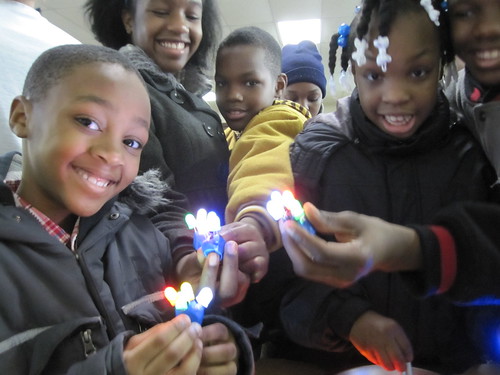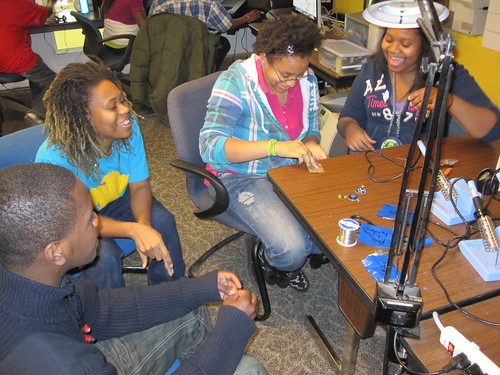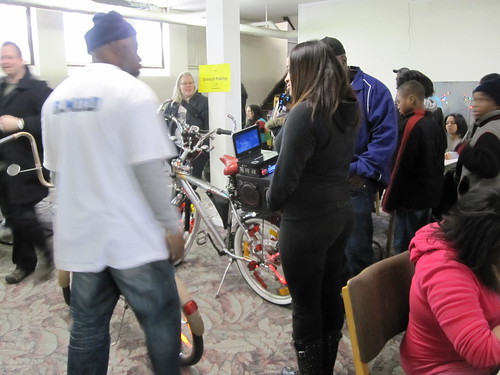Detroit: A Vision for Technology’s Future
Blog Post
March 15, 2012
Few media narratives about Detroit describe the city’s potential to define our technological future. Instead we hear stories of crumbling buildings, empty streets or, conversely, its rise as a burgeoning city of everything hip and cool. Yet every four months or so, hundreds of Detroiters take part in shaping the future of technology through innovative community-led DiscoTechs.
DiscoTechs, a short name for “Discovering Technology,” are semi-regular multimedia fairs organized by the Detroit Digital Justice Coalition. The coalition is a group of 10 different social justice organizations who have come together with the shared belief that communication is a human right. For the last two years, Detroit’s DiscoTechs have been on hiatus because the coalition was focused on administering a $2 million dollar Broadband Technology Opportunities Program grant to establish public computer centers and digital literacy programs in the city. The fair on February 26th was the first DiscoTech since the group received the grant.
At the fairs, participants take part in interactive workshops and explore the impact and possibilities of technology within their communities. The Makerspace at the Church of Messiah, in the Mt. Elliot neighborhood, hosted the DiscoTech over a long Sunday afternoon. The fair attracted roughly 150 local residents while about 30 volunteers ran workshops, served food, and answered questions.
DiscoTechs are not only innovative in their goal to maximize and expand Detroiters’ technological skills, but also in their structure. The fairs are organized with separate “stations” in a large room led by volunteers with expertise in different technologies and their applications. At the most recent DiscoTech, participants learned how to make stencils, use social media, and disassemble a desktop hard drive. In a corner of the room, participants watched and discussed The Internet Is Serious Business, a documentary produced in 2008 by the People’s Production House and Center for Urban Pedagogy, about the technologies and policies that shape the Internet. At another table, two volunteers hosted a consultation station on privacy and answered questions about how to protect yourself online.
The DiscoTech offers a vision of the city where people of color are encouraged to engage in technology on their own terms. The inter-generational room of mostly Black Detroit residents painted a stark contrast to the sobering statistics around the digital divide. Rather than allow themselves to be seen as victims of federal communication policies that limit their digital participation -- or as passive recipients of more recent digital inclusion policies which can be alienating or condescending -- people of color at the DiscoTech actively armed themselves with the technical skills to ensure they won’t be left behind in the digital age. At one station, a 10-year-old girl taught an elder how to solder electronic components to a circuit board.
At another station, a few young adult members of the East Side Riders, a custom bicycle club that uses bikes for community service, invited a woman in her 60s to join them in rides and service.
“This is the future,” said Gwendolyn Gaines, a member of the Michigan Welfare Rights Organization, a Detroit-based group of public assistance recipients and low-income workers advocating for welfare rights. For Gwen, a Detroit-raised, 60-year old advocate, the DiscoTechs represent one simple hope for her community - that they will be woven into the fabric of the digital future.
It isn’t a surprise that a new vision of the future might emerge in Detroit. It’s a city that has survived social voyeurism, economic poverty and political strife. February’s DiscoTech was just one testament to the city’s brilliance and unwavering resiliency, which has the potential to define the future of technology for the rest of the country. However, this vision of our digital future can only surface if we allow Detroit to define its own technological narrative.


